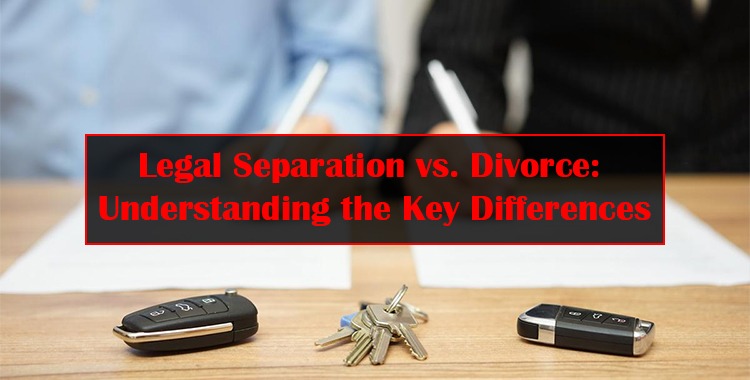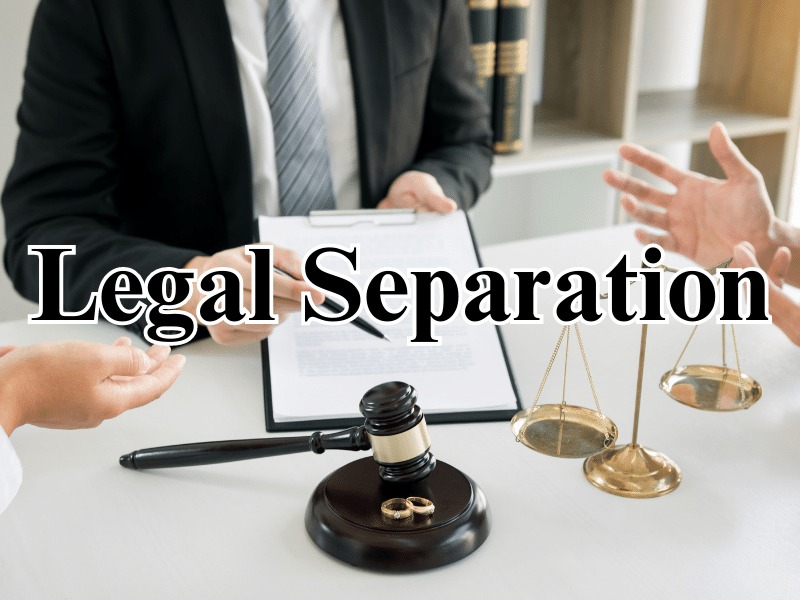When facing challenges in a marriage, deciding on the next steps can feel overwhelming. Should you pursue a legal separation or opt for a divorce? Understanding the difference between separation and divorce is crucial, as both come with unique implications for your finances, family, and future. But where do you start? Do you need a lawyer for legal separation, or can you navigate the process alone? These questions might weigh heavily on your mind, and that’s completely normal.
In this blog, we’ll unpack the nuances of legal separation vs. divorce, highlighting the key differences and benefits of each. Whether you’re exploring legal separation for its potential advantages or seeking clarity on divorce lawyer consultations, this guide will provide the insights you need to make informed decisions. Let’s explore the path that’s right for you.
Understanding the Basics: Legal Separation vs. Divorce

When your marriage hits a crossroads, it’s essential to understand your options. Two common path legal separation and divorce are often confused, but they are distinct processes with unique implications. So, what exactly sets them apart, and how can you decide which is right for you?
What is Legal Separation?
Legal separation allows couples to live apart while remaining legally married. It’s a formal agreement that outlines arrangements such as:
- Division of property and finances
- Child custody and visitation schedules
- Spousal and child support obligations
Unlike divorce, legal separation doesn’t dissolve your marriage. This can be a significant benefit for couples who want to preserve their marital status for personal, religious, or financial reasons.
What is Divorce?
Divorce, on the other hand, is the legal end of a marriage. Once finalized, both parties are free to remarry and have no legal ties beyond any court-mandated obligations. Divorce typically involves:
- A complete division of assets and debts
- Permanent arrangements for child custody and support
- Termination of spousal benefits like shared health insurance
Key Differences Between Legal Separation and Divorce
Here’s a quick comparison to help clarify the difference between separation and divorce:
- Marital Status: Legal separation keeps you married, while divorce ends the marriage.
- Flexibility: Legal separation offers the chance for reconciliation, whereas divorce is final.
- Financial Implications: Some couples choose legal separation to retain benefits like shared health insurance or tax advantages.
Pros and Cons of Legal Separation
Pros:
- Allows time and space to evaluate your relationship
- Retains benefits like health insurance or joint tax filings
- May align with religious or cultural beliefs
Cons:
- Requires formal legal proceedings, similar to divorce
- Doesn’t completely sever ties
Pros and Cons of Divorce
Pros:
- Provides closure and the freedom to remarry
- Clearly separates finances and responsibilities
- Removes the stress of ongoing legal ties
Cons:
- Can be emotionally and financially draining
- Ends any benefits tied to marital status
Both options have unique advantages and challenges, and the right choice depends on your personal circumstances. If you’re unsure, consulting with a legal separation attorney or exploring divorce legal advice can offer clarity and guidance.
Key Factors to Consider When Choosing

Choosing between legal separation and divorce isn’t a one-size-fits-all decision. It’s deeply personal and depends on several factors unique to your situation. So, how do you weigh the pros and cons to make the right choice for your future? Let’s break it down.
Financial Implications
One of the first things to consider is how each option affects your finances:
- Legal Separation: This can allow you to maintain shared benefits, such as health insurance or joint tax filings.
- Divorce: While it provides financial independence, it may also mean losing certain benefits tied to marriage.
If preserving financial stability is critical, consulting with a professional for legal separation vs. divorce costs is a smart move.
Emotional and Family Dynamics
Think about the emotional impact on you and your loved ones:
- Are you emotionally ready for the finality of divorce?
- Could a legal separation provide the time and space needed to heal or reconcile?
For families with children, legal separation often feels like a less drastic change, helping children adjust to new dynamics more gradually.
Religious or Cultural Considerations
Some individuals face cultural or religious constraints that make divorce challenging. Legal separation can offer an alternative that respects these beliefs while still addressing practical concerns like child custody and spousal support.
Impact on Children and Custody Arrangements
The well-being of children is always a priority. With legal separation, the structure of the family remains intact, which might provide emotional stability for children. Divorce, however, creates a more definitive arrangement. Understanding the difference between separation and divorce in terms of custody agreements is crucial for making informed decisions.
Health Insurance, Taxes, and Other Legal Benefits
A legal separation may allow you to retain benefits like health insurance through your spouse’s employer. Divorce, however, cuts those ties completely. Consider consulting a professional to understand the long-term effects on:
- Health insurance coverage
- Tax filing status
- Retirement benefits
By evaluating these factors, you can gain clarity on the option that best aligns with your goals and circumstances. Seeking divorce vs. separation legal advice can help you navigate these considerations with confidence.
Do You Need a Lawyer for Legal Separation or Divorce?
As you navigate the complexities of legal separation or divorce, one question often arises: “Do I need a lawyer?” While it’s possible to handle some aspects on your own, hiring a lawyer often brings clarity, protection, and peace of mind.
When Legal Guidance is Crucial
Certain scenarios make professional legal help essential:
- Complex financial arrangements, such as shared businesses or investments
- Disputes over child custody or spousal support
- Cases involving significant debt or property division
A legal separation attorney or divorce lawyer consultation can help ensure your rights are protected in these situations.
Can You Navigate the Process Without a Lawyer?
While some individuals successfully manage simpler cases independently, there are risks involved. Missing important legal details can lead to costly mistakes down the road. If you’re uncertain about your case, it’s better to err on the side of caution and consult with a professional.
How a Lawyer Can Protect Your Rights and Interests
Hiring a lawyer for legal separation or divorce ensures:
- Fair division of assets
- A clear and enforceable custody agreement
- Compliance with state laws and regulations
Legal professionals can also help streamline the process, saving you time and stress.
Costs Associated with Hiring a Lawyer
Worried about attorney fees? It’s a valid concern, but think of it as an investment in your future. A well-structured agreement can save money in the long term by avoiding disputes or legal errors.
Finding the Right Legal Representation
Not all lawyers are created equal. Look for someone experienced in family law, and don’t be afraid to ask questions during your initial consultation. A lawyer who understands your priorities can make all the difference.
Alternative Dispute Resolution Options
If the thought of a court battle makes you uneasy, you’re not alone. Many couples opt for alternative dispute resolution methods to handle their separation or divorce more amicably. These approaches can save time, money, and emotional energy.
Mediation: A Cost-Effective Solution
Mediation involves working with a neutral third party to reach an agreement. It’s often faster and less expensive than litigation, making it a popular choice for couples who can communicate effectively.
Collaborative Law: Working Together to Find Agreement
Collaborative law encourages both parties to work with their lawyers and other professionals to negotiate terms. This approach fosters cooperation and minimizes conflict, which is particularly beneficial for families with children.
Arbitration: When Decisions Need Authority
In arbitration, an arbitrator makes binding decisions based on both parties’ presentations. It’s a middle ground between mediation and going to court, offering efficiency without sacrificing fairness.
Benefits of Avoiding Court Litigation
Court battles can be stressful and expensive. By exploring alternative options, you can:
- Reduce legal fees
- Retain control over decisions
- Resolve disputes in a private, less adversarial environment
Whether you’re considering mediation or collaborative law, seeking divorce vs separation legal advice can help you determine the best approach for your situation.
Preparing for the Process
Whether you’re leaning toward legal separation or divorce, preparation is key. Taking the time to organize your thoughts, documents, and resources can make the process smoother and less stressful.
Gathering Necessary Documents and Information
Start by collecting key records, including:
- Financial statements (bank accounts, debts, assets)
- Tax returns from the past few years
- Legal documents like prenuptial agreements
Being organized ensures you have everything needed for negotiations or legal proceedings.
Setting Realistic Expectations
Understand that this journey may not be easy, but being prepared can help you manage stress. Having a clear understanding of your goals whether it’s shared custody, fair asset division, or financial stability will guide your decisions.
Financial Planning Before Legal Action
It’s wise to plan for the financial implications of separation or divorce. Consider:
- Setting up an individual bank account
- Budgeting for legal and living expenses
- Consulting a financial advisor to assess long-term impacts
Emotional Support and Resources
Divorce and separation aren’t just legal processes; they’re deeply emotional experiences. Surround yourself with supportive friends, family, or professional counselors to help you navigate the challenges ahead.
Taking proactive steps now can make all the difference later. Whether it’s consulting a legal separation attorney or exploring community resources, preparation is your greatest ally.
Conclusion
Deciding between legal separation and divorce is a significant life decision, one that carries both emotional and legal implications. By now, you’ve explored the key differences, benefits, and challenges of each option and you’ve learned how important it is to consider factors like finances, family dynamics, and long-term goals.
But what’s next? Should you seek out a legal separation attorney to guide you through the process, or is it time to schedule a divorce lawyer consultation to finalize your decisions? The answer lies in your unique circumstances. What works for one person may not work for another, and that’s okay. What’s important is that you approach this journey with clarity, preparation, and the right resources.
Remember, you don’t have to navigate this alone. Whether it’s through legal advice, mediation, or simply leaning on a support system, there are tools available to help you move forward with confidence. Take the time to reflect on what matters most to you your financial stability, your children’s well-being, or perhaps even the possibility of reconciliation.
Ultimately, making an informed choice about legal separation or divorce sets the foundation for a brighter, more secure future. With the right guidance, whether it’s from a separation vs divorce legal expert or through alternative dispute resolution, you can take this step with confidence and peace of mind.
You deserve a solution that aligns with your values, priorities, and vision for the future. Trust yourself to make the decision that’s best for you and know that the support you need is within reach.
FAQs
-
What is the difference between legal separation and divorce?
Legal separation allows a couple to live apart while remaining legally married, whereas divorce legally ends the marriage.
-
Do I need a lawyer for legal separation?
While not mandatory, hiring a lawyer ensures proper filing of agreements regarding finances, custody, and support during legal separation.
-
Is legal separation less expensive than divorce?
Legal separation can be less costly upfront, but ongoing legal and financial obligations may make it as expensive as a divorce in the long term.
-
Can I convert a legal separation into a divorce?
Yes, in most cases, legal separation agreements can be converted into a divorce decree if both parties agree.
-
What are the benefits of choosing legal separation over divorce?
Benefits include retaining health insurance, preserving marital status for religious reasons, or providing time for reconciliation.
-
The Best Bank Loan Options for Small Business Owners in the USA/UK in 2025
Navigating the world of small business loans can feel overwhelming, especially with so many options available in 2025. How do you determine which loan is the best fit for your business? With evolving trends in financing and an increasingly competitive landscape, choosing the right bank loan isn’t just about interest rates it’s about finding a…
-
Top 18-Wheeler Truck Accident Lawyers in the USA/UK in 2025
Navigating the aftermath of an 18-wheeler accident can be overwhelming. These massive vehicles, essential to commerce, can cause devastating consequences when involved in crashes. If you’ve found yourself asking, “How do I secure the compensation I deserve after a truck accident?” or “Who can guide me through the complexities of a truck injury claim?” you’re…
-
How to Maximize Your Car Accident Settlement in the USA/UK in 2025
Navigating the aftermath of a car accident can be overwhelming, especially when it comes to securing the compensation you deserve. How do you ensure your claim is handled properly? What steps can you take to maximize your settlement? Whether you’re dealing with mounting medical bills, insurance adjusters, or legal complexities, understanding the process is essential.…



